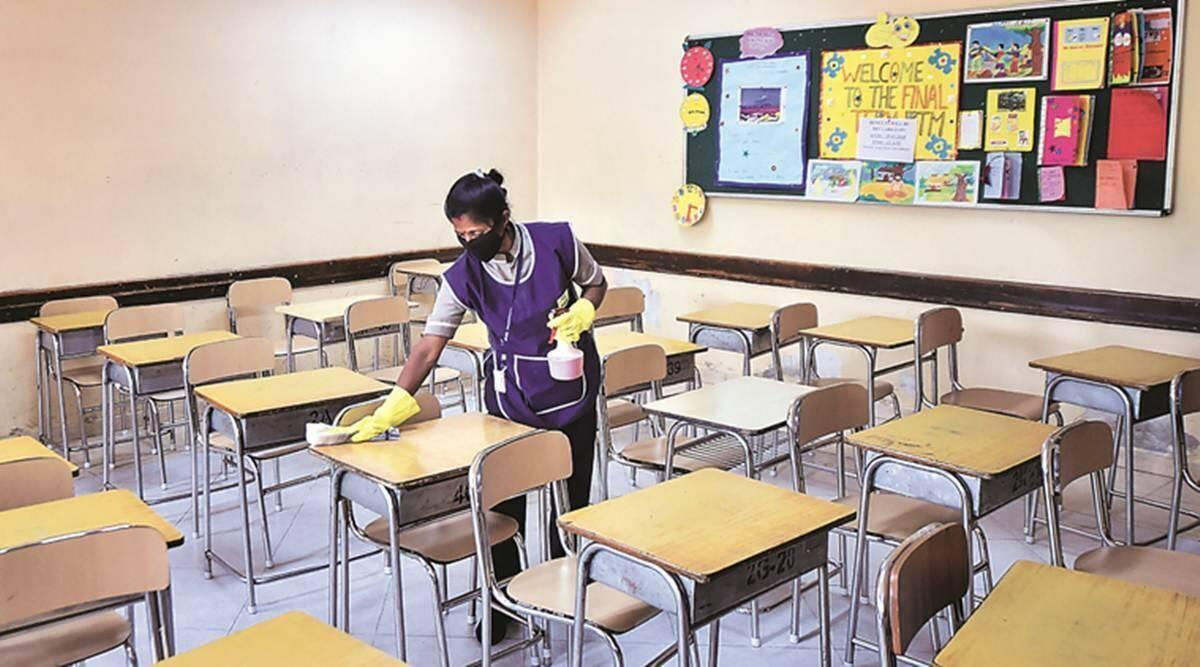India
Schools need more than guidelines as they reopen in third wave
Teachers and parents concerned as schools prepare for reopening.

The Maharashtra Government, a couple of days ago, gave its nod to the reopening of schools across the state, considering the demands of the parents, teachers and experts. The decision lies with the local body governments in the state, whether to reopen schools in their areas or not. However, with the number of daily COVID cases in several cities still concerning and a lack of clear back-to-school policy from the state, parents have begun expressing worries about whether it would be in the best interest of the children to send them to school amid the third wave. Moreover, with almost no tangible support from the government, teachers, especially from rural areas, say they will be finding it difficult to manage schools and keep children safe.
“While the demand to reopen the schools was valid, the increasing number of COVID cases has led to a feeling of insecurity among parents in urban areas. And moreover, there is no policy available to reassure them that their children will be safe at schools,” education activist and Aam Aadmi Party (AAP) leader Mukund Kirdat said.
Maharashtra Deputy Chief Minister and Pune district Guardian Minister Ajit Pawar said on Saturday that the schools in the district will be closed for at least another week, as the number of daily COVID cases continues to be high.
Schools in around six municipal corporations, including Mumbai, Thane, Nashik, Akola, are set to reopen on Monday. However, parent activist from India Wide Parent Association (IWPA) Anubha Sahai has raised objections over a lack of a hybrid mode of teaching. Hybrid mode refers to a combination of online as well as offline classes. “They say that the number of cases is low, but the situation is still concerning. In Mumbai, some schools have even upto 100 students in one class. Even if they decide to call 50 percent of those at a time, how are they going to maintain physical distance between the children? That’s why, it would be better if the schools offered online teaching as well, so that parents could make a choice,” Sahai said.
She also said that she saw some schools sending notices to parents that only the vaccinated children from the age-group of 15 to 17 could attend school, which is unfair. Sahai’s organisation was looking into the matter and thus did not disclose further details about the situation.
सोमवारपासून शाळा सुरू होत आहेत. शाळा हे विद्यार्थ्यांसाठी नंदनवन आहे. सुरक्षित शिक्षणाची सुरुवात करताना विद्यार्थ्यांनी कोणती काळजी घ्यावी ते जाणून घ्या. @scertmaha @MahaDGIPR @mybmcedu pic.twitter.com/CobOtHo8Sb
— Prof. Varsha Eknath Gaikwad (@VarshaEGaikwad) January 23, 2022
The circulars issued by the government bodies do not mention hybrid classes, again pointing out the unclear nature of government instructions. Moreover, with limitations on the use of public transport and unavailability of school transport yet, the question of how the children are going to reach their schools also remains unanswered. A survey by the online community platform LocalCircle across tier-I, tier-II/III and tier-IV cities of the state showed that about 62 percent of parents in Maharashtra are unwilling to send their children to school from tomorrow.
Several private schools in urban areas, on the other hand, have said that they are prepared and ready to take students back. “We are ready. We can reopen the schools any time. It’s the sudden government instructions when they ask us to shut down the schools that are difficult. It’s good that this time parents came ahead asking for the schools to remain open. Everything else is open anyway. Then why shut schools? Children are safe in schools. The period of almost two years when schools were online has caused huge learning loss. We cannot afford to keep students at home anymore,” Bharat Malik of Private Unaided School Management Association (PUSMA) said.
But there are schools that have another story to tell as well. While teachers agree that the learning loss that the students have faced over the past two years needs to be taken care of, they also worry about how to take care of the students once they come to school, especially amid the third wave caused by a more contagious variant of coronavirus.
“There is a group of parents, mostly parents of English medium students, who are saying that the schools must reopen soon. The parents are asking us to take responsibility for their children at school. But we are concerned about how to do that effectively. These days, if we look around, someone gets a fever in the morning and by evening, they test positive for COVID. We have the usual guidelines like fully vaccinated children, sanitisation of schools, etc. There are some new ones like calling 50 percent children each on alternate days,” Satish Gavali, Principal, Modern High School, Pune said.
“We need to start schools at the earliest. It’s not enough to run classes just for classes X and XII. Each class is important. But right now, I don’t think schools will start until the number of cases goes down to at least 500-600,” he added.

Guidelines are not enough, this shows. “We have the guidelines, but where are the means to ensure safety,” says Kishor Kathole, a teacher at a Zilla Parishad (ZP) School in Moj village in Palghar district.
He explains, “In our school, we need to provide masks to our students. We need sanitisers for the school. We have to do all of this by seeking help from NGOs. There is nothing from the government. Just like the State Government has given instructions to the local body governments to make decisions about the reopening schedule, they should also be allocated funds to support schools in their jurisdiction to create a safer environment for children.”
He does feel though that it’s time to start school now. “We just need to go step by step. In Palghar, we are starting schools for classes VIII to XII now. If they go well, I think it would be safe to start schools for all classes by February 1. It’s necessary,” he said.
Coming back to the point of reassurance, Kirdat also points out that as important it was to decentralise the decision-making on whether to start schools or not, it is equally important to provide local bodies and schools with tools and means to ensure that the schools will be safe for children.
“What we really need is an education task force. How to take care of children at school is not the only issue. The pandemic has worsened the problem of fee hikes and parents everywhere are suffering because of it. There is the issue of transport, we don’t know yet how the majority of children are going to reach their schools tomorrow. There is of course the issue of the learning loss of the last two years that needs to be taken care of. That’s why we need to look at this from a policy point of view,” Kirdat added.
Meanwhile, the schools that are about to start this week are trying their best to be 100 percent ready to receive children back. “The school management committee is meeting tomorrow about the reopening. But we are starting school on Tuesday. Of course, there are guidelines like only 50 percent of children will be allowed at a time. Also, we have asked parents from containment zones or those with COVID patients at home not to send their kids to schools. Also, we teachers have to be fully vaccinated. We are pretty sure we will be able to run schools safely,” says Vinodkumar Bhong, a teacher at a municipal school in Kolhapur.





